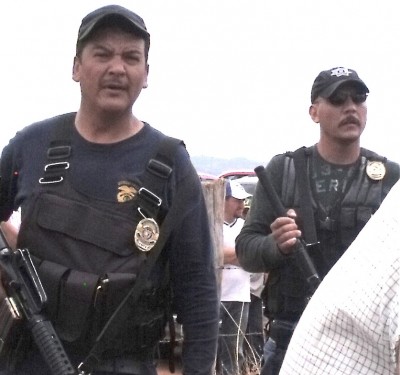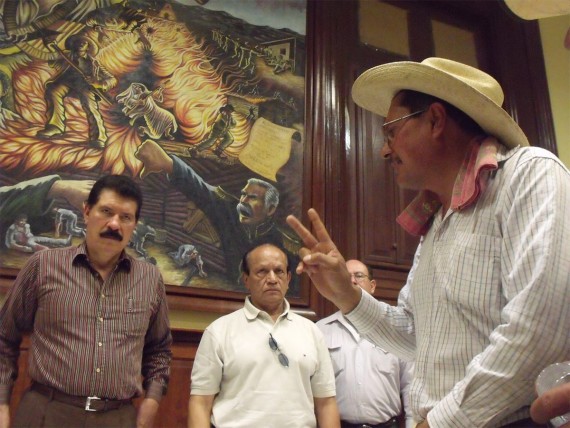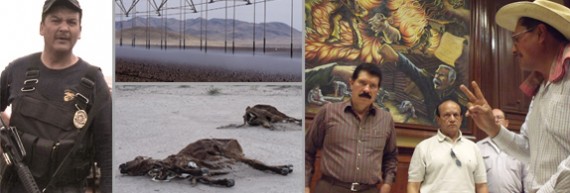 Shell casings of bullets fired by municipal police atop plat map showing illegal wells
Shell casings of bullets fired by municipal police atop plat map showing illegal wells
in Flores Magón region (Photos by Tom Barry)
“Mennonites got up like medicine show rubes in their straw hats and bib overalls and a row of children…”—Cormac McCarthy, The Crossing (1995)
Mexican Mennonites are a curiosity.
Always the same peculiar appearance: the men in bib overalls invariably leading the way, their women forever a step or two behind in flower-print dresses that drop down to dowdy black shoes, and a brood of children invariably in tow.
They are a people apart—set apart from Mexican society by their Old World attire but also by their skin color (Northern European white) and by their Platt-Deutsch language (a Dutch-influenced Low German dialect). It’s as if they came from another century, another hemisphere.
When shopping at Costco in El Paso or when visiting the Pink Store in Palomas (or most anywhere in Chihuahua), you may, on occasion, see these Old World farming families, and then turn your head to stare and wonder: Where did they come from, where do they now live, and how have they managed to stay so exclusive and removed from our rapidly modernizing society?
Unlike the Mormon settlers (famously the Romneys) in Chihuahua, Mennonites don’t intermarry outside their ethnic and linguistic communities), don’t proselytize, and normally don’t interact socially with non-Mennonites.
While most Mennonite men speak Spanish at varying levels of fluency, Mennonite women generally aren’t conversant in Spanish—or any language other than their sect’s German dialect. Education beyond sixth grade is rare, healthcare is primitive, and medical conditions caused by inbreeding are widespread.
Lately, part of the curiosity about Mexican Mennonites is how these fundamentalists now stand at the vanguard of a revolution in land management in Mexico’s arid north. Over the past decade, Mexican Mennonites have been changing their style—not how they dress or interact socially but their traditional farming patterns.
Once forbidden as a transgression of God’s natural laws, irrigated agriculture backed by increasingly deep wells and the most advanced farming machinery has become the norm. Mennonite farmers are meeting—and taking advantage of—the challenges of climate change and intensifying drought cycles by embracing the most unsustainable practices of capital-intensive, resource-depleting agribusiness.
With large families—typically six or more children—Mennonites in Chihuahua routinely outgrow their original colonies, obligating them to establish new farming colonies. Leaving the original colonies, they are converting barren rangeland and desert expanses into agribusiness plantations by tapping groundwater reserves with new wells descending to unprecedented depths.
Nowhere is this phenomenon so evident as in the new Mennonite colonias that lie directly along the Chihuahua-New Mexico border.
“Curious and curiouser,” you might observe.
Recently, Mennonite expansionism into new areas of Chihuahua has set off what could well be described as the first water wars of the climate-change era. The Mennonites are not alone in buying up abandoned rangeland ravaged by unprecedented drought and turning desert into lush farmland, but they account for an estimated 95% of the new agribusiness operations in Chihuahua.
For the past nine decades, the relations between the Mennonites and the Mexicans have been largely amicable—in part because there is little direct interaction with the Mennonite enclaves, in part because Mennonite agriculture has boosted the regional economy (and been an important source of seasonal farm labor for surrounding communities), and in part due to awe of Mennonite productivity and their intense work ethic. The modest, unassuming and pacific behavior of the Mexican Mennonites has also won the respect of Chihuahuenses.

Police approaching to stop me taking photos.
Over the last year, however, the traditional Mennonite/non-Mennonite coexistence has started to shatter. As the Mennonite colonies have expanded to previously uncultivated areas of the state, the proliferation of hundreds of deep wells for irrigation is rapidly depleting aquifers and basins as neighboring farmers and ranchers see the yields from their shallower wells dramatically diminish.
Mennonite colonization has long been driven by the hunger for new lands to support ever-growing families and communities. Echoing a common story, Sara, a teacher at an elementary school in the border colonia of El Camello, told me: “Ten years ago we moved north from Cuauhtémoc because there wasn’t any more land or water.”
For four centuries, land hunger and escaping the sprawl of Babylon have driven a Mennonite global diaspora. Over the past few years, as Chihuahua suffers a drought at levels not experienced since the 1940s, there is widespread acceptance among Chihuahuenses that climate change is intensifying and prolonging traditional drought cycles.
One result has been escalating demands by small farmers and members of ejidos (government granted land), along with environmental organizations, that the federal and state governments halt and reverse the proliferation of deep wells, leading to heated and sometimes violent incidents.
The most tragic and ominous was the Oct. 21 assassination of a leader of the small farmers’ organization El Barzón and his wife. They had been organizing against the illegal and unsustainable pumping of groundwater by a Canadian mining company and new agribusiness operations in central Chihuahua. The murdered couple had also been associated with the newly formed Colectivo de Defensores del Agua del Desierto Chihuahuense.
Several months previously, on July 2, the first shots of the new water war in Chihuahua were fired by rogue police in an unsuccessful attempt to end the mobilization of more than 300 small farmers who had gathered to prevent the drilling by Mennonite farmers of yet another illegal well south of Flores Magón. Wielding semi-automatic weapons, the police barged into the gathering of unarmed farmers and forcibly attempted to confiscate the camera of a reporter/photographer—me—who was chronicling the Barzón-organized action.

Martín Solís confronts government ministers and Conagua officials at ad-hoc meeting in Palacio de Gobierno that night.
When the farmers pushed closer to prevent the police from successfully seizing my camera, the uniformed gunmen began firing up in the air and into the ground—a confrontation that is now regarded as the first skirmish in the new water wars.
At a late-night meeting in the Palacio de Gobierno in Chihuahua City, top state and federal officials met with the frightened and indignant farmers and agreed to form a collaborative working group to identity and shut down illegal wells in that water basin. In response, a few days later a quickly organized small group of Mennonite farmers declared that they would protect their wells and their livelihoods, taking up arms if necessary despite their religiously professed pacifism.
Over breakfast, the morning of the fateful mobilization, Martín Solís, the Barzón leader who in June had launched the initiative to identify illegal wells and work with the government to shut them down, told me: “Look, the main problem is climate change, which is increasingly affecting Mexico’s arid northern regions. As we see it, these dramatic changes in the climate are intensifying the droughts we have always had here.”
But it is more than nature gone awry, he added, “There is the underlying and persistent problem of corruption and bad governance, specifically in this case the failure of the government to apply the laws and regulations about water use.”




Responses to “The Coming Water Wars in Mexico”